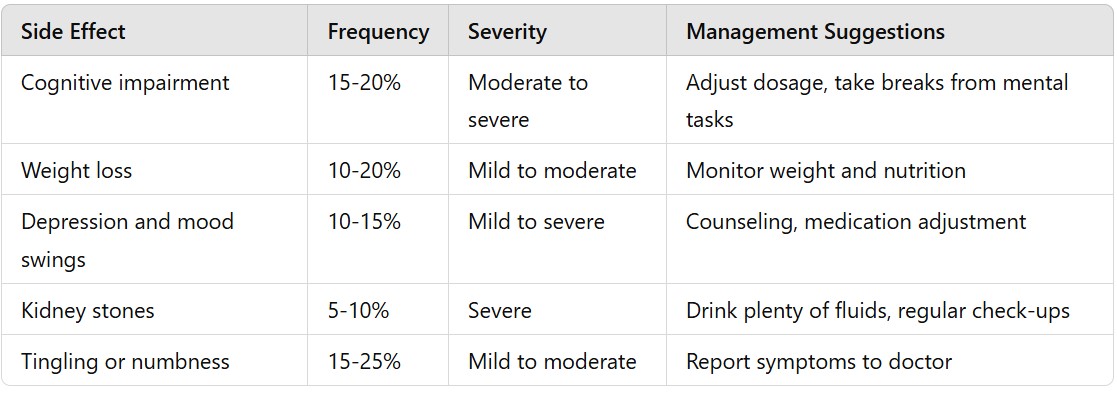For many individuals suffering from epilepsy, migraines, or other neurological conditions, Topamax (generic name: topiramate) has been a lifeline, offering significant relief. However, for some users, the drug’s side effects can be so severe that they feel like “Topamax ruined my life.” From cognitive impairments to emotional disturbances and physical complications, the consequences of taking Topamax can be far-reaching. In this article, we’ll explore the side effects and warnings associated with Topamax, real-life experiences, and why it’s crucial to consider both the benefits and risks before starting treatment.
What is Topamax?
Topamax is an anticonvulsant drug, which works by stabilizing electrical activity in the brain. It is commonly prescribed for:
- Epilepsy: Prevents and controls seizures.
- Migraine prevention: Reduces the frequency of migraine headaches.
- Off-label uses: Sometimes prescribed for weight loss, anxiety disorders, and bipolar disorder.
Despite its effectiveness for these conditions, it’s essential to understand that not everyone responds to Topamax in the same way. Many patients have experienced serious adverse effects that have led them to question whether the medication is worth the risks.
Common and Serious Side Effects of Topamax
While Topamax can provide relief from neurological and psychological conditions, its side effects can be severe. These side effects may interfere with daily activities, quality of life, and overall well-being.
1. Cognitive Impairments: “Cognitive Fog”
One of the most commonly reported side effects by those who feel that “Topamax ruined my life” is cognitive impairment. Known as the “Topamax fog,” this condition can include:
- Difficulty concentrating
- Memory problems
- Slurred speech or difficulty finding words
- Decreased mental sharpness
These issues can be particularly disruptive for people who rely on mental clarity for work, school, or daily life. For instance, some patients report struggling to complete tasks that require critical thinking or simple memorization.
2. Mood and Emotional Effects
Another area where Topamax users report issues is with their mood and emotional well-being. Common emotional side effects include:
- Depression: Feelings of sadness or hopelessness.
- Irritability: Unexplained frustration or anger.
- Anxiety: Increased nervousness or panic attacks.
These mood changes can dramatically affect relationships, work, and social interactions. There have been several reports of patients feeling emotionally distant, disconnected, or even suicidal while on the medication. In fact, the FDA has issued warnings about the potential for suicidal thoughts and behaviors in patients taking Topamax.
3. Weight Loss and Dehydration
While some people may benefit from the weight loss effects of Topamax, it can be problematic for others. For individuals who are already underweight or struggling with eating disorders, this side effect can worsen their condition. Severe dehydration, particularly when combined with reduced appetite, can lead to:
- Dry mouth
- Dizziness
- Fatigue
- Kidney stones
Some users also report gastrointestinal issues, such as nausea and diarrhea, which can compound the effects of dehydration.
4. Vision Problems
Topamax can cause visual disturbances such as:
- Blurred vision
- Double vision
- Eye pain
These issues can range from mild to severe and, in rare cases, lead to permanent vision loss. The development of these symptoms often requires the immediate discontinuation of the drug.
5. Tingling or Numbness
A common and uncomfortable side effect of Topamax is “paresthesia,” or the sensation of tingling and numbness, particularly in the fingers, toes, and face. This can feel like pins and needles, making daily tasks such as typing or driving difficult and frustrating.
6. Kidney Stones
Another serious side effect that could ruin your life is the development of kidney stones. Topamax increases the risk of kidney stones, which can cause severe pain, urinary issues, and sometimes require surgical intervention.
Real-Life Experiences: “Topamax Ruined My Life”
The impact of Topamax on users can be drastic. Many have taken to online forums and social media to share their stories, feeling as though the medication has had a severe negative impact on their lives.
- Example 1: A 32-year-old woman, who had been prescribed Topamax for chronic migraines, said, “I felt like I was losing my mind. I couldn’t remember simple things. It was like I was in a haze all the time. I couldn’t even focus on a book, and my social life evaporated. I eventually had to stop taking it because of the severe cognitive issues.”
- Example 2: Another individual, diagnosed with epilepsy, experienced significant weight loss and dehydration, leading to hospitalization. He said, “The side effects from Topamax were much worse than the seizures. I lost too much weight and started feeling nauseous all the time. It was a nightmare.”
These personal stories are not uncommon, and they highlight the real dangers that Topamax users may face.
Statistics and Data on Topamax Side Effects
While individual experiences may vary, research has provided insight into the frequency and severity of Topamax’s side effects. According to clinical trials and patient surveys:
- Cognitive side effects: About 15-20% of patients experience some form of cognitive dysfunction while on Topamax.
- Mood disorders: Approximately 10-15% of users report mood swings, irritability, or depression.
- Kidney stones: Research shows that up to 1 in 5 individuals using Topamax may develop kidney stones during treatment.
- Weight loss: Weight loss is commonly reported by 10-20% of patients on Topamax, although this side effect is more prominent in people with a predisposition to losing weight.
Warnings and Precautions
If you’re considering taking Topamax or are already on it, there are several crucial warnings to keep in mind:
1. Suicidal Thoughts and Behavior
The FDA has issued a black box warning for Topamax due to the increased risk of suicidal thoughts and actions. It’s essential for patients to be closely monitored, especially in the early stages of treatment.
2. Interaction with Other Medications
Topamax can interact negatively with several other medications, including:
- Oral contraceptives: Topamax may decrease the effectiveness of birth control pills.
- Other anticonvulsants: Using Topamax with other seizure medications can increase the risk of side effects.
3. Dehydration and Kidney Problems
Given the risk of kidney stones and dehydration, patients are advised to drink plenty of water and avoid excessive alcohol while on Topamax.
4. Pregnancy Category D
Topamax should not be taken during pregnancy unless the benefits outweigh the risks. The drug has been associated with birth defects, including cleft lip and palate.
How to Manage Side Effects
If you are experiencing significant side effects from Topamax, it’s essential to consult with your healthcare provider immediately. They may recommend:
- Adjusting the dosage: Sometimes reducing the dose can alleviate some of the side effects.
- Switching medications: If the side effects are unbearable, switching to another medication may be necessary.
- Supportive therapies: Therapy or counseling can be beneficial for managing mood changes and cognitive issues.
Conclusion: Topamax Ruined My Life
While Topamax is a useful medication for many, it has the potential to cause significant side effects that can negatively impact quality of life. From cognitive impairments to severe mood changes and physical complications like kidney stones, the side effects of Topamax are not to be taken lightly. If you believe that “Topamax ruined my life,” it’s important to seek help from a healthcare professional. Discussing potential side effects and exploring alternative treatments can help you regain control of your health and well-being.
Common Side Effects of Topamax

FAQs
1. Can Topamax cause permanent brain damage?
No, Topamax does not cause permanent brain damage, but it can lead to cognitive impairment while you’re taking it.
2. Is Topamax safe during pregnancy?
Topamax is classified as pregnancy category D, meaning it can harm the fetus and should be avoided unless absolutely necessary.
3. How long does it take for Topamax side effects to appear?
Side effects can appear within the first few weeks of taking Topamax, although some may develop later.
4. Can Topamax cause suicidal thoughts?
Yes, Topamax has been linked to an increased risk of suicidal thoughts and behaviors, especially in the early stages of treatment.
5. Can I stop taking Topamax suddenly?
No, discontinuing Topamax suddenly can cause seizures. Always consult your doctor before stopping the medication.
6. Are there alternatives to Topamax for migraines?
Yes, there are several other medications for migraine prevention, including beta-blockers, antidepressants, and other anticonvulsants.











